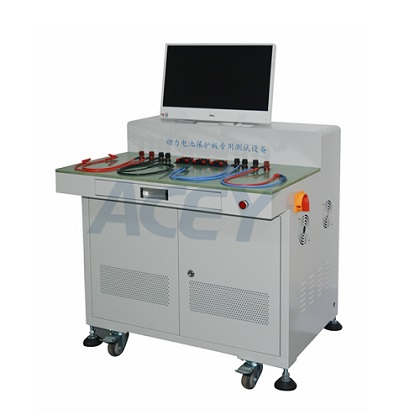Categories
Function of BMS Lithium Battery Management System
April 13 , 2022Function of BMS Lithium Battery Management System
The main task of BMS lithium battery management system is to ensure the design performance of the battery system, which can be divided into the following three aspects:
1) Safety, protect the battery unit or battery pack from damage and prevent safety accidents;
2) Durability, make the battery work in a reliable and safe area and prolong the service life of the battery;
3) Power to keep the battery working in a state that meets the requirements of the vehicle
Function of BMS testing system
1. Battery parameter detection. Including total voltage, total current, voltage detection of single lithium battery (to prevent overcharge, over discharge and even reverse polarity), temperature detection (it is better to have temperature sensors for each string of batteries and key cable joints), smoke detection (monitoring electrolyte leakage, etc.), insulation detection (monitoring leakage), collision detection, etc.
2. Lithium battery state estimation. Including state of charge (SOC) or depth of discharge (DoD), state of Health (soh), functional state (SOF), energy state, fault and safety state (SOS), etc.
3. Online fault diagnosis. Including fault detection, fault type judgment, fault location, fault information output, etc. Fault detection refers to the use of diagnosis algorithm to diagnose the fault type and carry out early warning through the collected sensor signals.
4. Battery safety control and alarm. Including thermal system control and high-voltage power safety control. After the BMS diagnoses the fault, it notifies the vehicle controller through the network and requires the vehicle controller to deal with it effectively, so as to prevent the damage to lithium battery and human body caused by high temperature, low temperature, overcharge, over discharge, overcurrent and leakage.
5. Charging control. BMS has a charging management module, which can control the charger to charge the lithium battery safely according to the characteristics of the battery, the temperature and the power level of the charger.
6. Battery equalization. The existence of inconsistency makes the capacity of lithium battery pack less than that of the smallest monomer in the pack. Battery equalization is to use active or passive, dissipative or non dissipative equalization methods to make the capacity of the battery pack close to the capacity of the smallest unit as much as possible.
7. Thermal management. According to the temperature distribution information and charging and discharging requirements in the lithium battery pack, the intensity of active heating / heat dissipation is determined to make the battery work at the most suitable temperature as far as possible and give full play to the performance of the battery.
8. Information storage. It is used to store key data, such as SOC, SOH, SOF, SOE, cumulative charge discharge ah number, fault code and consistency.
Acey new energy provides professional BMS testing machine for battery pack.
